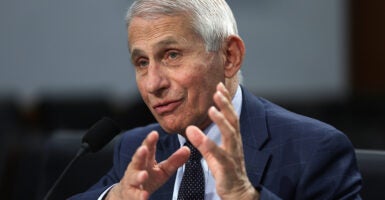Expect fireworks. On Monday, Dr. Anthony Fauci is scheduled to testify under oath before the House Select Subcommittee on the Coronavirus Pandemic to account for his performance during the COVID-19 pandemic.
Fauci, former director of the National Institute for Allergy and Infectious Diseases, appeared before the select subcommittee earlier this year for a closed-door, 14-hour transcribed interview conducted over two days.
Needless to say, congressional investigators have a lot of ground to cover Monday, ranging from Fauci’s advice on mask mandates to his oversight of coronavirus research grants and response to the Chinese origins of the global pandemic.
Meanwhile, subcommittee Chairman Brad Wenstrup, R-Ohio, has requested that Fauci, who retired at the end of 2022 after 38 years heading NIAID, turn over personal email accounts and cellphone records.
The reason: Dr. David Morens, Fauci’s senior adviser for over two decades, revealed to the subcommittee under oath May 22 that he transmitted official records to Fauci through his own personal email to avoid congressional inquiries or public oversight under the Freedom of Information Act, or FOIA.
As revealed that same day in a subcommittee staff memo, Morens stated in a postscript to an email to colleagues April 21, 2021: “I forgot to say there is no worry about FOIAs. I can either send stuff to Tony [Fauci] on his private email, or hand it to him at work or at his house. He is too smart to let colleagues send him stuff that could cause trouble.”
In another email to colleagues May 13, 2021, Morens referred to “our secret back channel” for sensitive communications, copying Peter Daszak, president of the EcoHealth Alliance, the controversial organization that received federal grant money for work at the Wuhan Institute of Virology in Wuhan, China.
Secret Back Channel Exposed. For sound reasons, Daszak’s relationship with Fauci and other leaders at the National Institutes of Health is a focus of congressional investigators. In Morens’ May 22 testimony to the House subcommittee, he revealed how he directly assisted Daszak in securing more taxpayer funding for his enterprise.
In April 2020, in the early stages of the global pandemic, the National Institutes of Health suspended a grant to New York-based EcoHealth Alliance, which had subcontracted scientific work to the Wuhan Institute of Virology for studying bat coronaviruses. In the wake of that grant suspension, his personal emails reveal, Morens worked behind the scenes to help Daszak quell NIH’s criticism of his compliance with reporting requirements and get EcoHealth’s federal grant reinstated.
Commenting on these extraordinary efforts, Wenstrup observed:
In your Gmail on March 29, 2021, you responded to Dr. Daszak with edits to a letter that he sent to the NIH. On Oct. 25, 2021, you responded to Dr. Daszak that you would edit an EcoHealth press release regarding the grant termination. On April 28, 2020, you responded to Dr. Daszak with edits to an EcoHealth press release regarding the grant termination. On Oct. 25, 2021, you [also] provided Dr. Daszak with advice regarding preparing a timeline regarding EcoHealth’s late five-year report submission. On Dec. 7, 2021, you wrote to EcoHealth’s chair of [the board of] directors to ‘put in a word’ for Dr. Daszak.
Federal grants to EcoHealth Alliance were marked by controversy throughout the pandemic. In April of 2020, NIH suspended grant funding. In August of 2020, NIH restored it. In 2021, EcoHealth once again came under agency scrutiny because of late reporting on its work in Wuhan, China.
Throughout this period, Morens worked hard to assist EcoHealth. In the process, he went to extraordinary lengths to evade the requirements of the Freedom of Information Act and avoid public accountability. During the recent House hearing, Rep. Debbie Lesko, R-Ariz., read off a litany of his emails.
For example, on November 18, 2021, Morens wrote:
With the help of our IT folks, I went over the whole computer and phone situation. They loaded some anti-hacking software on my phone and discussed the situation with me. Basically, my Gmail is now safe from FOIA and hacking on all my devices, including government computer and phone and my private computer and ipad. Thus, it should be safe to communicate safely with you, Peter, and others, as long as we use my private Gmail.
The subcommittee staff’s report catalogues numerous other examples of these efforts to hide official records and other information related to COVID-19.
They include:
- On June 16, 2020, in an email to EcoHealth’s Daszak, Morens writes: “The FOIAs are dreadful and paranoia-inducing. In the old days we had to do them ourselves, by hand. I mean finding and printing out thousands of emails coming in and going out. Now then sometimes FOIA text messages too. …. We are all smart enough to know to never have smoking guns and if we did we wouldn’t put them in emails and if we found them, we’d delete them. In my 22 years at NIAD [the National Institute of Allergy and Infectious Diseases] I have never seen a FOIA that turned up useful information.”
- On June 28, 2021, in an email referring to an unwanted congressional inquiry, Morens relates how he deleted “Peter Daszak’s emails and others relating to origin [of COVID-19]” and writes to Dr. Peter Hotez, a professor at Baylor College of Medicine: “Mine was erased long ago (I verified that today) and I feel pretty sure Tony’s was too. The best way to avoid FOIA hassles is to delete all emails when you learn a subject is getting sensitive. In any case, there is nothing here except opportunities to hassle, harass, and huff and puff.”
- On Oct. 5, 2021, in an email to EcoHealth’s Daszak, Morens writes: “Peter I just got news that a FOIA picked up an email I sent to you saying that Tony commented he was braindead, jokingly, of course. However, [Sen.] Ron Johnson is all over it and now after me. Tony will be pissed, rightly so. I deleted that email but now learn that every email I ever got since 1998 is captured and will be turned over, whether or not I instantly deleted it. Gmail, phone, text, I need to rely on those exclusively.”
Inside Help. Remarkably, even the National Institutes of Health’s FOIA officer, Marg Moore, apparently helped Morens learn “tricks” to hide official records from the public.
Embedded in the subcommittee staff report is this gem from a Morens email dated Feb. 24, 2021: “I learned from our foia lady here how to make emails disappear after I am foia’d but before the search starts, so I think we are all safe. Plus, I deleted most of those earlier emails after sending them to gmail.”
During testimony before the subcommittee lasting nearly two hours, Morens stated that there were many things he was unsure of or could not remember. These include speaking to Fauci about conversing with Daszak over Gmail and his personal phone calls or other conversations with Fauci about deleting emails.
Although no one ever has been indicted for having a bad memory, the assessment of Morens’ performance at the hearing was nonpartisan.
Rep. Kweisi Mfume, D-Md., remarked: “Sir, I think you’re going to be haunted by your testimony today.”
Congressional oversight hearings not only provide vital public information, but lay the groundwork for remedial action. Following Daszak’s sworn testimony May 1 and the recommendations in the subcommittee’s report, the U.S. Department of Health and Human Services barred Daszak and his EcoHealth Alliance from participating in federal grant programs for at least three years and possibly longer because they failed to report in a timely fashion to NIH officials on EcoHealth’s risky coronavirus research in China.
In this case, it’s clear that Congress should revisit the Freedom of Information Act.
Mark Tapscott, a senior official at the U.S. Office of Personnel Management during the Reagan administration, has argued that violations of the nation’s sunshine law should carry serious criminal penalties.
Congress also should consider transferring then responsibility of responding to public inquiries under FOIA to the inspector general’s offices of individual federal agencies, which already conduct internal oversight of agency operations.
The House Select Subcommittee on the Coronavirus Pandemic is far from finished. A crucial and unanswered question: Why?
Why have federal officials gone to such extraordinary lengths to delay, dissemble, or hide vital information from Congress and the public on matters related to the origins of COVID-19 and their response to the resulting global pandemic?
On Monday, when Fauci himself is scheduled to testify in public, perhaps he can answer that question. But don’t bet on it.





























